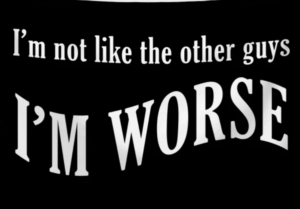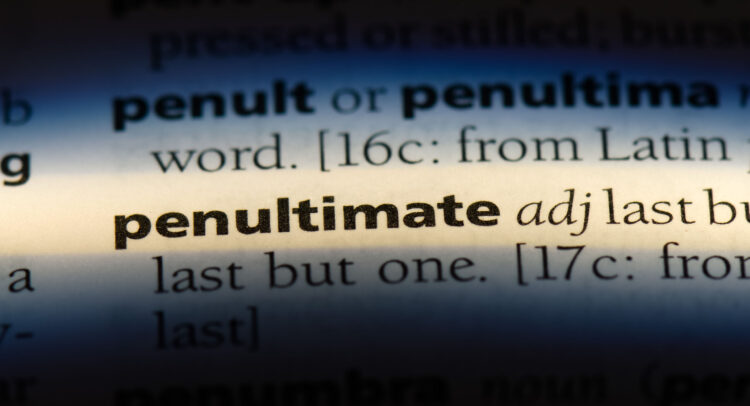Raboyseyee and Ladies,
Rock Hard!
Welcome to Parshas Ha’zeenu and its 52 pisukim -3rd shortest parsha in the heylige Toirah- and to Shabbis Shuva (Shabbis of repentance). Why taka is Ha’zeenu so short? Especially so when compared to Parshas Nosi and others with over 150 pisukim? Ver veyst? Ober, who can blame Moishe for being a bit stingy with the words; he was -after all- busy writing 13 Torah scrolls, on this his last day of life, and still needed time to climb up the mountain where he would pass away in accordance with the RBSO’s wishes and commands. What to do? Instead of talking, Moishe decided to sing the gantze parsha as one long song.
Ha’zeenu is the penultimate parsha. Don’t know that word? Look it up: it’s the next to last parsha in the entire heylige Toirah and soon enough, a new cycle will begin with Odom, Chava, the snake and other colorful characters -most of whom angered the RBSO- all coming back to life. We certainly missed them. By the end of the parsha reading this week, all 613 mitzvis will have been taught and delivered, the last two mamish in our parsha. With them and as discussed over the years, came hundreds of business opportunities for the motivated Toirah inspired entrepreneurs. And that’s why raboyseyee, the rebbe would tell us over and again that ”Toirah is de beste schoira.” As discussed over the years, myriad business opportunities have sprung forth from those who were able to convince us vulnerable Yiddin that their product or service is what the RBSO wants us to have. In the past two weeks alone, the heylige Ois has gotten several Instagram messages from a gentleman not known to him who is no a personal shopper and who is willing to spend his time shopping for the bigger, the best and nicest and the not beautiful esrog money can buy. Si that what the RBSO had in mind? Ver veyst and mistama not.
In Ha’zeenu, Moishe will tell us -by way of song- that the Yiddin will become engaged in very sinful practices and that the RBSO will respond with very serious measures. What else is new? Ober, as we have discussed in previous weeks, ultimately the RBSO after schmeising us silly, will redeem the Yiddin and bring the world to its perfect state. Asks the Ramban azoy: Generally, the heylige Toirah predicts that misfortune will follow only if the Yiddin act in sinful ways and promises blessings when they act properly. We never find the Toirah stating as a matter of fact that the Yiddin will definitely follow a sinful course. How is it, and why is it that Moishe makes a prediction about the Yiddin’s behavior as a fait accompli? Did Moishe have insider information? Was he a member of Congress or the Senate? Was his last name Pelosi?
Ober the Ramban answers his own question by quoting from the parsha. Says the heylige Toirah (Devorim 31:21) azoy: “Because I know what your evil inclination does today before I bring you into the Promised Land.” Herein lies the answer as to Moishe’s prediction with a degree of certitude. Moishe chapped that the Yiddin’s less than admirable behavior thus far was an indication of their future behavior. Imperfections in their character would inevitably become exposed in the future. The bottom line: Moishe was saying so shtark (harshly) azoy: Although no specific generation will necessarily fall into sin, sinfulness will inevitably occur at some point. Let’s remember the great power of the yetzer hora. We are not a match. An imperfect seed cannot produce a perfect tree.

Sadly raboyseyee, Moishe’s words, though veiled at the time, taka came to pass. The history of the Yiddin taka includes times of abundance and surplus coupled mamish with a decline in morality. Shoin, let’s not forget that man’s yetzer hora avada grows as his riches increase and as discussed over these last few weeks, the yetzer horo, is difficult to tame. Veyter…
Ha’zeenu and the last parsha in the Toirah –V’zois Habrocho which we’ll hear on Simchas Toirah, contain Moishe’s last words to the Yiddin before the RBSO carries out His sentence of not allowing Moishe to lead the Yiddin into the Promised Land. Seemingly it’s not a very good idea to anger the RBSO: He has a long memory especially for tzadikim (the righteous) that make tiny errors of judgment. Avada that’s more than givaldige news and a great relief to most of you; we are taught that the RBSO punishes those good guys for the tiniest of infractions. Avada that brings up the very famous Talmudic expression of “tzadik v’rah loi (loose translation: at least at times, righteous people have it bad, meaning they are seemingly not rewarded –in this world- for their exemplary behavior). Many pages have been written by dozens of commentators and exegetes trying to understand why the RBSO runs the world as He does, ober, this topic for another day. The bottom line: He’s the boss! It’s not our business to chap everything, neither physically, if you chap, nor spiritually. Ober, does it pay to be good if good guys finish last? Ver veyst and Veyter.
The bottom line of our parsha? In Parshas Ha’zeenu Moishe tells of a relationship gone awry. According to the song or poem – referred to by many as “Shiras Moishe (the Song of Moishe), the RBSO established a special relationship with the Yiddin and lovingly watched over and cared for them. How did the Yiddin react? They sinned -over and again- rejected the RBSO and turned to other deities, say it’s not so. Let us remember that the RBSO is a jealous G-d. Enraged at their betrayal, the RBSO resolves to decimate Israel. Ober, in the end, the RBSO relents after realizing that the other nations might misinterpret the demise of the Yiddin as a testament to their own power, not as a divinely inflicted punishment. And that raboyseyee, is a summary of not our parsha but of several in Sefer Devorim. The bottom line: the Yiddin are a stiff-necked people, hard as solid rocks. Speaking of stones, let us close with this. One of the remarkable things about Moishe’s poetic composition is the many different metaphors he uses to describe the RBSO. In the span of just fifteen pisukim (4-18), we find metaphors for the RBSO as a rock, a father, an eyelid, an eagle, and a mother. Which is He? Ver veyst? We shall explore this a different time.

We find the word “rock” eight different times in the Song of Ha’zeenu: five times to depict the G-d of Israel (pisukim 4, 15, 18, 30, 31), twice as an ironic reference to foreign gods (31, 37), and once -posik 13- in connection to oil produced from a “flinty rock (חלמיש צור).” That being said, the rock metaphor does not operate the same way in each of the pisukim and context makes the metaphor mean different things in each. All that for another shabbis.
As it turns out, “Shiras Ha’zeenu” is but one of five ‘songs’ found in the heylige Toirah and Tanach. Even those who weren’t paying attention while in yeshiva, will recall how and when Moishe originally burst into song just as the Yiddin -having been released from slavery- crossed the sea. He put out his still famous Oz Yoshir single as recounted in Shmois 15: 1-19. For that song, he was seemingly accompanied by an all-male choir. As the lyrics tells us “Oz Yoshir Moishe, U’vnei Yisroel (then Moishe sang along with the Yiddin: avada males only). As an aside, the first ever women’s single featured Moishe’s sister, Miriam, and immediately followed the Oz Yoshir. Was she the first feminist? For some reason, her song does not count as one of the five. Shoin! The next song is found in our parsha and is, as mentioned above, Moishe’s swan song; he will be passing away later that day. Seemingly it was a killer song! Ober the music did not stop and the heylige Novee will record three more songs. Each is known for the artist who composed it, and they are: “Shiras Yehoishua” found in the Novee (Yihoishua 12:1-24); “Shiras Devoirah” (Shoiftim 5:1-31) and “Shiras Dovid” found in (Shmuel II 22:1-51).
Ober, how do we know these are songs vs. regular exchanges or speeches? And the answer is quite simple: A ‘song’ is defined as a parsha in the heylige Toirah or Novee which is written in a unique and special pattern. When you see it, you know it!
And the question is azoy: Why would Moishe, knowing he’s minutes, or even hours from passing away, be singing? Ver veyst! Avada it’s easy to chap why one or more would break into song having participated in, or even witnessed a miraculous event. Splitting of the sea was certainly a great nais (miracle). Ober, having the ability to sing in the face of adversity is seemingly what separates regular Joe’s from greatness; Moishe was taka great. And so was Dovid Hamelech (King David) whose ability to sing despite personal tragedy which would have broken the spirits of lesser men, was mamish inspirational. Instead of avoiding the painful topic, Moishe addressed it head-on, displaying absolute acceptance of the RBSO’s will. Dovid sang when escaping from his own son who was attempting to usurp his power (also to kill him).

The bottom line: Yiddin love to sing, singing inspires; it’s part of our fabric. In fact, our weekly parshas and the Novee come with cantillations which produce various sounds depending on when they are being read. Each sets the proper mood. Mistama the RBSO likes to hear us daven and to read the heylige Toirah with some melody. Ober does everyone agree that there are but five songs in the heylige Toirah and Novee? Of course not! According to other sources, there are ten. We shall cover these on another occasion.
In any event, as he is about to pass, Moishe offers a poetic presentation of the history of the rocky relationship between the Yiddin and the RBSO and his perspective on the future. It’s not all that pleasant. The words in Ha’zeenu are shver (difficult) mamish, even for the few of you who can learn some basic Chumish without having to resort to the English translation. It’s not easy to chap the exact sense of the words, they are written in a highly literary, and often obscure style and some taka wonder what suddenly got into Moishe on this, the last day of his life. If any of you are serious about understanding this seminal poem, you’ll have to read it very closely, examine the imagery, get a sense of the structure, fall asleep, and after a few hours, try again. Good luck!
Asks Rav Levi Yitzchok of Barditchev azoy: why, at the end of his life and the end of the Toirah, did Moishe suddenly depart from the prose style which he had used for most of his life and speak instead, in verse? Not just does he ask this kasha but he also offers an explanation that were anyone else to suggest it, zicher that person would be placed into cheyrim (excommunicated).
Said Rav Levi Yitzchok, that on this day, Moishe’s last, he was weak and tired and zicher neither the man nor the Novee (prophet) he had once been. Moishe was therefore forced to abandon the clear, direct, precise, and readily understandable prose style which he employed for most of his career and lapsed, instead, into an obtuse, allusive, stylized and difficult-to-chap poetic style. What all that means, the Ois has no clue, ober continues Rav Levi Yitzchok: the poetic material which Moishe sang out at the end of his life does not constitute a crowning artistic achievement but, rather, a falling off of his powers of communication, a lapse, brought on by his advanced age, failing powers, and impending death. Yikes! Could this be pshat?
Let’s chazir (review): Moishe predicts with 100% accuracy how the RBSO and the Yiddin will treat each other in the future, it’s not a very pleasant picture. Says Moishe: the Yiddin, as they have done in the past, will abandon the RBSO in their illusory sense of affluence and security. The Yiddin will become comfortable in the land, build their homes, grow rich, and spurn the RBSO. Sound epes familiar? Oy vey!
The RBSO will zicher get very upset with His Chosen People, punish us severely –as He has- ober in the end, He will not completely and destroy them. Moishe predicts that the RBSO will avada save the Yiddin, but not on account of their good deeds; rather because He has a larger agenda. What was the RBSO’s agenda? Thankfully, the other nations are much worse! Mamish. When compared to them, the Yiddin were, and remain, nisht azoy giferlich (not all that terrible). Everything is relative. We too are hard like rocks, a tough bunch of survivors.

The heylige Ois will be back Sunday morning with his annual Michila (forgiveness) form so that you can properly apologize to the many you have aggrieved this past year.
A gittin Shabbis!
The Heylige Oisvorfer Ruv
Yitz Grossman
